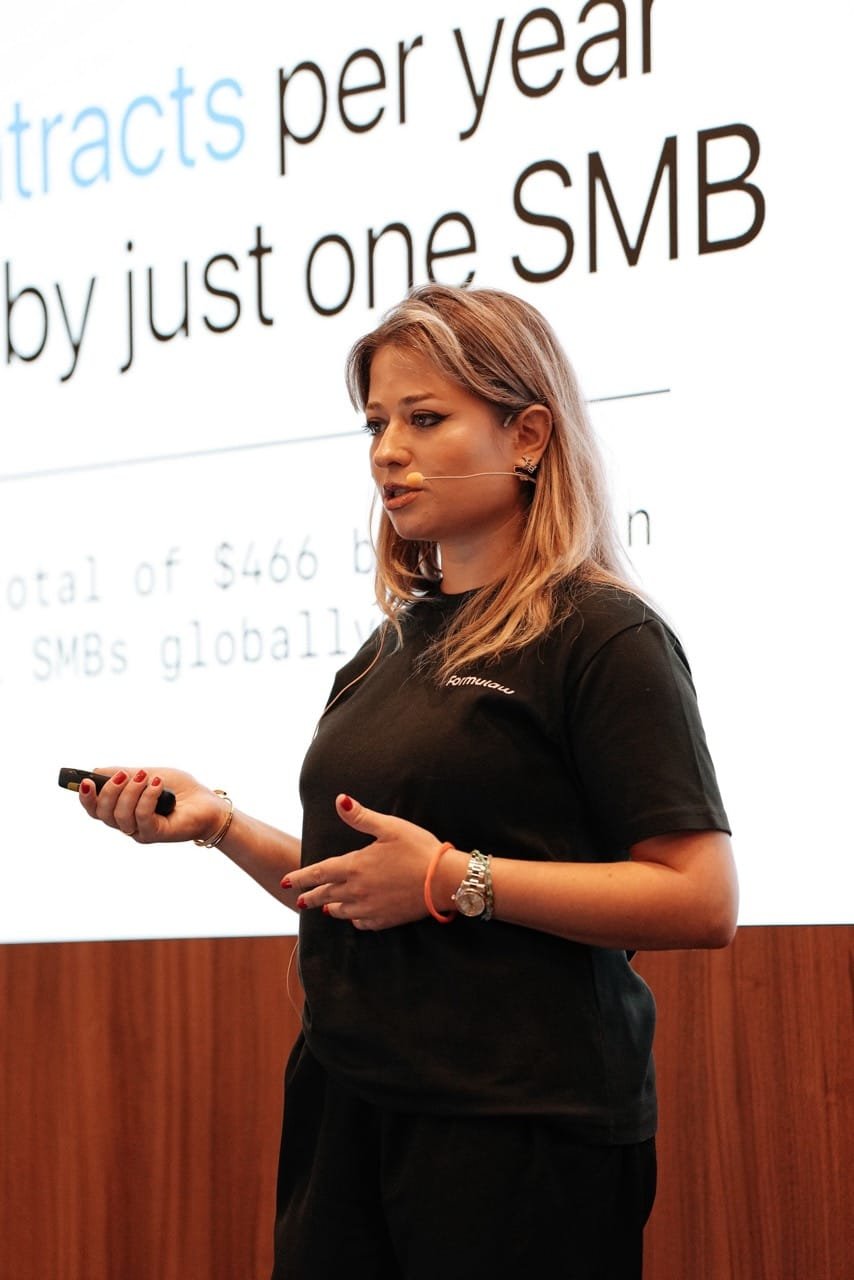London-based legal tech startup Lawhive has raised $40 million in a Series A round, contributing to what has already been a historic year for venture capital in the legal technology space.
The round was led by GV and TQ Ventures, just seven months after Lawhive’s £9.5 million seed round, which was also backed by GV and Episode 1 Ventures. While no valuation was disclosed for the company, it was valued at $63.5 million in April of this year.
Follow THE FUTURE on LinkedIn, Facebook, Instagram, X and Telegram
With the new funding, Lawhive aims to expand into the U.S. market, where research from the American Bar Association reveals that 80% of consumer legal needs remain unmet. The U.S. legal market is valued at an estimated $1 trillion annually, presenting a massive opportunity.
“The U.S. legal market, one of the largest in the world, is primed for disruption,” said Schuster Tanger, co-managing partner at TQ Ventures. “The urgent demand for affordable legal services creates the perfect environment for innovative tech like Lawhive to make an impact.”
The legal tech sector has seen an explosion of large funding rounds this year as startups aim to modernize a centuries-old industry. In July, Canadian company Clio raised $900 million in a round led by NEA, valuing the company at $3 billion. Meanwhile, U.S.-based Harvey closed a $100 million Series C led by GV.
Driven by AI, legal tech venture capital funding globally has surged to a record $2.7 billion, according to PitchBook—a 170% jump from 2023.
While the U.S. remains the dominant force in legal tech deals, Europe has also experienced growing investor interest. In 2024, European legal tech startups raised $322.1 million, marking the second-highest total on record and a 51% increase from the previous year.
Lawhive’s $40 million Series A is now tied with London-based Luminance’s Series B as the largest legal tech venture deal in the region this year.
The legal tech industry is experiencing unprecedented growth, with AI-driven solutions reshaping legal services. Startups are racing to develop tools that enhance efficiency, lower costs, and make legal assistance more accessible.
One of the rising stars in the legal tech space is Formulaw, a Cyprus-based startup leveraging AI to transform legal services. The company recently showcased its potential by participating in the Startup World Cup Cyprus Finals 2024.

While the global market is evolving at breakneck speed, startups in smaller ecosystems like Cyprus navigate a distinct landscape—one filled with both challenges and opportunities. To gain a deeper understanding of this space, we spoke with Violetta Skittidi, co-founder of Formulaw, about the industry’s rapid transformation.
At this turning point for legal tech, startups like Formulaw are reshaping the legal sector by using AI to enhance efficiency and accessibility. With investor interest surging, the future of the industry will likely be driven by specialized solutions that tackle legal complexities with precision and innovation.
Violetta shares her perspective on emerging trends, investment flows, and what’s next for legal tech in Cyprus.
Can you share more about your startup and how it differentiates itself in the growing legal tech space?
Launched just nine months ago in Cyprus, our startup’s mission is to bridge the legal knowledge gap for small and medium-sized businesses (SMBs) through AI-powered tools. Initially focused on empowering businesses, we quickly found that legal teams were facing significant challenges with routine, time-consuming tasks like contract review, which became our primary area of focus.
Our first product, an AI-driven deep contract review tool, leverages our proprietary legal reasoning model to deliver efficient, accurate contract analysis. The market response has been overwhelmingly positive, confirming the growing demand for smarter legal automation.
What sets us apart from many other legal-tech solutions is our emphasis on precision. While most competitors focus on full contract lifecycle management, we specialize in contract review, offering an intuitive AI solution that improves efficiency without replacing human judgment.
One of the key differentiators for us is our dedication to AI accuracy and data security. While many competitors prioritize speed and automation, we are leading the way in reducing AI-generated errors and ensuring robust data protection directly within our models. This commitment to security and reliability is something that is still rare in the market.
Looking forward, we are excited about expanding our product range with truly original ideas. One of our long-term goals is to develop what we believe could be the first AI paralegal—a virtual assistant capable of handling routine legal tasks with human-like reasoning and contextual understanding. This vision sets us on a path to redefine how legal teams can operate, paving the way for more intelligent, secure, and scalable legal solutions.
What trends in legal tech do you find most promising, and how can startups position themselves to take advantage of them?
The future of legal tech is increasingly tied to the rise of AI agents and agentic AI solutions, which are gaining traction in the legal space. At Formulaw, we are particularly excited about the potential of these technologies to transform how legal professionals manage time-intensive tasks, significantly enhancing the efficiency of legal workflows.
While existing legal-tech solutions have already made a positive impact on legal operations, full industry adoption remains a challenge. This is largely due to the evolving nature of AI technology, which is not yet fully reliable for automating complex legal tasks. The next phase in legal-tech innovation isn’t about replacing human expertise but developing AI that can genuinely alleviate some of the workload for lawyers.
For legal professionals, the biggest hurdle isn’t a lack of knowledge, particularly when it comes to contract drafting or review; it’s time. The most impactful innovations in the sector will be those that address this challenge head-on—streamlining processes and reducing the burden on lawyers without adding additional layers of oversight.
The next big breakthrough in legal tech will likely come from a company that successfully deploys AI agents to autonomously handle routine legal tasks. This will free up lawyers to focus on higher-value work. While the technology is not yet at this point, the race to refine and perfect it is already underway, and the potential for disruption in the industry is immense.
How does the legal tech ecosystem in Cyprus compare to regions like the U.S. and the UK, and what are the main opportunities for growth in Cyprus?
The legal-tech landscape in Cyprus differs significantly from regions like the U.S. and the UK, particularly in terms of the solutions being developed. Despite Cyprus’s services-based economy, the legal-tech sector here is still emerging. Ironically, the majority of tech solutions being developed are finance-related, rather than legal-tech innovations.
A significant challenge for startups in Cyprus is the gap between early-stage development and seed funding. While numerous accelerators assist in taking a product idea to its MVP stage, the lack of resources for the next phase—seed funding—remains a major hurdle.
However, the market is evolving, with noticeable changes in the startup ecosystem. Government grants, venture capitalists (VCs), and private investor interest are all contributing to the growing support for startups. Despite this progress, Cyprus’s smaller market size remains a limiting factor, especially when compared to larger markets like the U.S. and the UK, where there is greater access to clients and funding.
Still, Cyprus has its unique advantages. The small, concentrated ecosystem can provide a fertile ground for startups to fine-tune their products and achieve market fit before expanding into neighboring countries.
What’s your experience in attracting investment?
Attracting investment in the legal-tech sector requires more than just offering an innovative product—it’s about fostering long-term relationships and securing a solid market presence.
We are currently in talks with investors, but our primary focus is on gaining a larger market share within our target demographics. For us, investment isn’t just a financial transaction—it’s about building a lasting partnership. Like any successful relationship, it’s crucial to ensure alignment for the long term, beyond the honeymoon phase.
The legal-tech space, like any emerging industry, relies heavily on reputation and connections. The right partner can make or break your product. The connections and reputation they bring are essential. And I underscore the importance of a strong network in this space.
While the legal-tech market is still evolving, we see a shift on the horizon. The market is maturing, and the focus is moving away from broad, one-size-fits-all solutions. Right now, many startups are chasing the same ambition—building an ‘AI legal assistant.’ However, as the sector grows, we’ll see investors and startups specializing in niche solutions for specific legal workflows or contract types.
This move towards specialization presents a unique opportunity for innovation. We see great potential in creating sophisticated tools that address specific needs. It’s not about generic AI tools or broad CLM platforms; it’s about developing solutions that truly make a difference in particular areas of legal practice.
What do you think is driving the rapid growth of legal tech, and how do you see AI shaping its future, particularly in expanding access to affordable legal services?
The rapid expansion of legal tech is not a surprise—it was an inevitability. For decades, the legal industry remained one of the most resistant to change, lagging behind other service-based tech sectors like fintech. The reason? A highly fragmented and specialized market that made large-scale innovation challenging.
However, a turning point has arrived. The growing demand for efficiency from businesses and legal teams has made transformation unavoidable. The biggest catalyst? AI. With advancements in large language models, such as ChatGPT, legal automation has become more powerful and accessible than ever before. While AI isn’t the sole driver of this shift, its impact is undeniable. It has significantly lowered the barriers to entry for automation, drastically reducing costs and making legal services more efficient and affordable at scale.
As AI continues to evolve, it is set to redefine how legal professionals operate—streamlining workflows, enhancing accessibility, and ultimately transforming legal tech from a niche sector into a fundamental pillar of the industry’s future.














